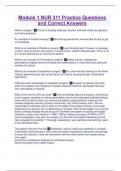Module 1 NUR 311 Practice Questions
and Correct Answers
What is surgery? ✅The art of treating diseases, injuries, and deformities by operation
and instrumentation
An example of curative surgery? ✅Necrotizing pneumonia, remove lobe of lung to get
rid of disease
What is an example of Palliative surgery? ✅tumor blocking part of bowel, no passage
of stool, removal will no cure cancer, humane action. Used to alleviate pain, focus is not
to cure the disease but to remove the ailment
What is an example of Preventative surgery? ✅Breast cancer, mastectomy,
preventative surgical removal of breast and hysterectomy in those that have particular
markers for cancer
What is an example of Exploration surgery? ✅Gun shot wounds, looking for the bullet.
Chronic abdominal pain and cannot figure out what is causing the pain. Exploratory
laparotomy
What are some advantages of outpatient surgery? ✅Cheaper to operate, less time
within the hospital, less incidence of health acquired infections, decreased recovery
time, less stress on hospital
What is the role of a Pre-op nurse? ✅Have knowledge about the surgery, what led up
to the surgery, specifics as well as generalities, know and understand pathophysiology,
know what to look for when you receive the patient, gauge patient's response and
families response (mental, physical, emotional), may hinder healing time.* We are
responsible to advocate what is best for the patient (only patient knows), know what
diagnostics are going to be run depending on surgery, what should trigger us to call the
doctor, perhaps surgery should be put off. Number one reason for putting off surgery
(infection, urinary tract infection**, WBC, CBCs) Calling off surgery (PT/INR or PTT)
lack of coagulation may alter the surgery (run the risk of the patient bleeding out) Do
risks outweigh the benefits?* Thorough assessment, very well documented (may need
to be referenced later)
The patient interview: Pre-Op ✅Scheduled: need to make sure repetition is avoided
(may hinder communication, client may shut down) Important to document accordingly
to avoid this situation, verify the information with the client rather than simply asking
over again.
Should be completed in advance for scheduled surgery
Good information from health history.
,Do they understand what is going on with surgery?
Expectations following surgery.
Be clear and concise in providing information, client needs to verbalize understanding of
the information
Assess emotional state (affects ability to sign consent/readiness)
Give plenty of time for answering questions (give straightforward, truthful responses, if
you do not know, tell the client you will get the information from them and then do it!)
Less stress on the client has what affects on healing/surgery? ✅Less time coming in
and out of anesthesia, less healing time
What causes anxiety in patients? ✅First surgery
Previous experience (family members have died in surgery)
Fear of death
Death in the OR is non-existent anymore, client is taken out of OR and moved to PACU
if death is suspected to be an outcome to remove the fear of death during surgery (OR
is for stabilizing)
Pain
Anesthesia
Thought of permanent or temporary disability
What can we do to lessen anxiety? ✅Give them information (not gory details) simple
terms
The fear of the unknown is the worst part of the hospitalization for the clients*
Provide knowledge correctly and accurately
Instill hope, never diminish their anxiety, assess support systems, request chaplain
What is involved in the Pre-op Assessment? ✅Allergies (drug, non-drug, latex)
Apply the band, check their name, identify and religious or cultural beliefs (Jehovah no
blood), Anticipations for the client post op (is there anything that the client is currently
suffering from that will hinder outcome of the surgery)
Performed system by system (assessment)
Patient history
Consents
Pre-op education ✅Make sure that you reiterate the importance of mobilization:
needed to prevent DVT, PE, pneumonia, bed sores, overall healing time.
Need to tell the client what to expect following surgery: will they have NG tube?
Drainage tubes?
Informed consent, blood consent, advanced directives and POAs on file!
When do we start thinking about discharge? ✅Upon admittance!
What is informed consent? ✅States that the patient understands everything that is
going to happen before, during and after surgery.
, Understand risks and benefits
Voluntarily giving consent (of sound mind, example: just because a client has a POA
does not mean that he can tell you to address his POA, if he is of sound mind he needs
to sign the consent)
Pre-Op Goals ✅Patients and you understand the risk
**Benefits outweigh the risks
# 1 job is patient advocacy, most dangerous place for the patient to be is in the hospital
under our care (mistakes happen) the longer the client is in our care, the probability of a
mistake increases (the faster they get out of the hospital, the better)
Intra-operative care, what is the setting like? Who is in the room? ✅Very cold, sterile
atmosphere
RN
Scrub Tech
Surgeon
Anesthesia Care Provider
Students
What are your responsibilities as an intra-operative nurse? ✅Need to be familiar with
technological advances
Maintain asepsis** imperative
Smooth transition of patients in and out, good communication between all members of
the team
What are the different areas of the OR? ✅Unrestricted- "locker room", change from
street clothes to scrub clothes
Semi-restricted- surgical attire, head and feet covered with booties, hallways
Restricted- within the OR, need to have scrubbed in (surgical hand scrub), no surfaces,
decreased dust
Holding area- post-op or pre-op waiting area for family
How is the OR controlled for prevention of infection? ✅Flow of people controlled
Air (negative airflow)
UV lighting (kills bacteria)
What does the preoperative nurse do? ✅Prepares room with team
Patient advocate throughout surgical experience
What does the circulating nurse do? ✅Not scrubbed, gowned, or gloved
Remains in unsterile field
Documents
What does scrub nurse do? ✅Follows designated scrub procedure




